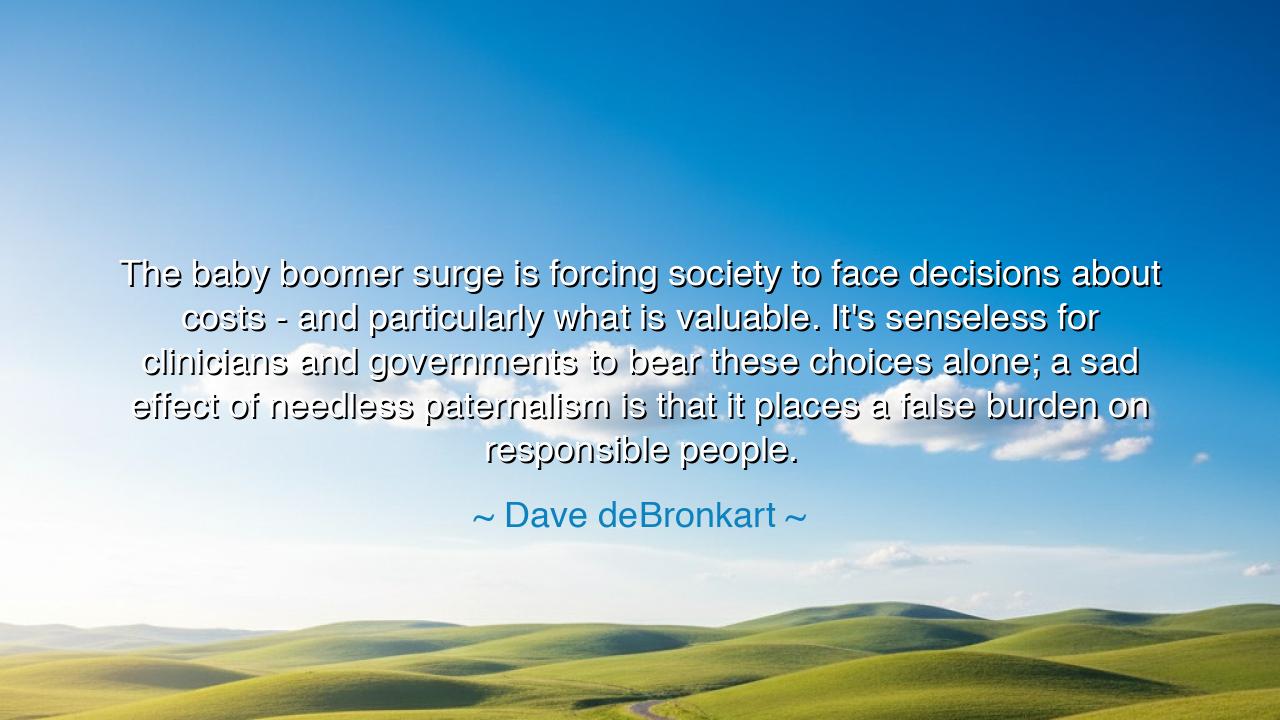
The baby boomer surge is forcing society to face decisions about
The baby boomer surge is forcing society to face decisions about costs - and particularly what is valuable. It's senseless for clinicians and governments to bear these choices alone; a sad effect of needless paternalism is that it places a false burden on responsible people.






Hear the words of Dave deBronkart: “The baby boomer surge is forcing society to face decisions about costs—and particularly what is valuable. It’s senseless for clinicians and governments to bear these choices alone; a sad effect of needless paternalism is that it places a false burden on responsible people.” This is not merely a reflection on policy, but a cry that echoes across the chambers of time, calling us to examine what we hold sacred, what we honor, and who carries the weight of our collective destiny.
In this saying lies a vision of generational tides. The baby boomer surge is no small wave; it is the swelling of millions who, having labored long, now face the season of frailty. They press upon the gates of medicine, of care, of society itself, and ask: what is the worth of a human life, and who shall decide the measure of that worth? To leave this judgment to rulers and healers alone is to invite imbalance, for they, though wise, are but a few, and the matter belongs to all. Thus deBronkart warns of paternalism—when authority withholds the voice of the people, when decisions are imposed rather than shared, and the burden falls unjustly on those who ought not bear it.
The ancients knew the peril of such imbalance. Recall the tale of Athens, where once decisions of war and peace were left to kings. Yet when the people rose and demanded their place in the Agora, a new order was born—democracy. In this order, the many shared the burden with the few, and though conflict and chaos often followed, the responsibility was rightly spread. So too must it be with matters of health and cost: to silence the people, to deny their voice in shaping what is valuable, is to return to a tyranny of benevolent masters, who though well-meaning, carry a false burden that should belong to the community.
Consider also the story of the Black Plague in medieval Europe. Cities turned to priests and rulers for guidance, yet the suffering was vast, and no single hand could bear the weight of so many lives lost. In time, it was the people themselves—merchants, mothers, farmers—who began to reshape their societies, to question authority, and to decide anew how to live, how to heal, how to care. Out of despair arose a new consciousness: that survival was not the work of rulers alone, but the shared labor of all. This same truth resounds in deBronkart’s words.
The false burden he names is more dangerous than it seems. For when we heap the weight upon governments or healers alone, two tragedies unfold: the leaders are crushed by impossible expectation, and the people grow passive, stripped of agency in the most vital questions of life and death. True responsibility must be shared. Every citizen must take part in the dialogue: what do we deem worthy of our resources, our time, our hearts? Shall we spend without thought, or shall we seek wisdom together?
The lesson for us, then, is clear: we must awaken from the slumber of passivity. The power to decide what is valuable does not belong solely to rulers or to physicians, but to all who share the fate of the community. Let every household speak, let every elder be heard, let every patient claim their rightful voice. This is not rebellion, but balance: the recognition that the health of the many cannot be stewarded by the few alone.
And what, then, shall we do? Engage in the councils of our time. Ask questions of those who govern. Speak with those who heal. Make your choices with awareness of cost, not only in coin but in spirit. Care for the old, not as a burden, but as a legacy. Share the weight of the generations, so that no single pillar breaks beneath it. For when all bear the burden, it is lighter; when all share the voice, it is truer; when all claim the responsibility, then justice and wisdom have a chance to flourish.
Thus the teaching is sealed: let no man or woman withdraw from the question of what is valuable. Let none say, “It is not mine to decide.” For in truth, it is the duty of all. And if we remember this, the false burden shall dissolve, and in its place shall rise a fellowship of care, of courage, and of enduring strength.






AAdministratorAdministrator
Welcome, honored guests. Please leave a comment, we will respond soon